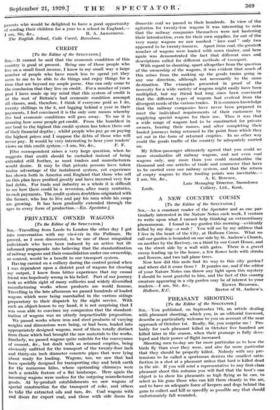PRIVATELY OWNED WAGONS
. [To the Editor of the SPECTATOR.] Sin,—Travelling from Leeds to London the other day I got into conversation with my vis-à-vis in the Pullman. He proved; as soon discovered, to be one of those misguided individuals who have been induced by an active but ill- informed propaganda into believing that the standardization of railway wagons and their consolidation under one ownership, or control, would be a benefit to our transport system.
Having carried on a colliery during the control period when I was dependent upon a' district pool of wagons for clearing my output, I knew from bitter experience that my casual friend was hopelessly wrong in his belief. Part of our journey took us within sight of many collieries and widely diversified manufacturing works whose products are world famous. Travelling in the late afternoon we passed hundreds of loaded wagons which were being marshalled in the various sidings preparatory to their dispatch by the night service. With such an object-lesson to my hand, it is not surprising that I was soon able to convince my companion that the standard- ization of wagons was an utterly impracticable proposition.
We passed works where iron and steel products of varying weights and dimensions were being, or had been, loaded into appropriately designed wagons, most of them totally distinct from those which had brought the raw materials to the works. Similarly, we passed wagons quite suitable for the conveyance of cement, &c., but dealt with as returned empties, being obviously unfitted for the transport of the twenty-four inch and thirty-six inch diameter concrete pipes that were lying about ready for loading. Wagons, too, we saw that had been specially designed for transporting clay and brick earth for the nuinerous kilns, whose upstanding chimneys were such a notable feature of a fiat landscape. Here again the incoming wagons were useless fOr the outgoing manufactured goods. At by-produCt establishments we saw wagons of special construction for the transport of coke, and 'others to take the extracted 'oils and tars, &c. Coal wagons with end doorg for export 'coal, and those with side- 'doors for
domestic coal we 'passed in their hundreds. In• view- of the agitation for twenty-ton wagons It was interesting to note that the railway companies themselves were not hastening their' introduction, even for their own supplies, for out of the very many wagons we saw marked " loco coal " only two appeared to be twenty-toners. Apart from coal, the greatest number of wagons were loaded with sawn timber, and here again was demonstrated the fact that different sizes and
descriptions called for different methods of transport. •
With regard to shunting, apart altogether from the question of the ownership of the wagons, it was evident that much of this arises from the making up the goods trains going in any one direction, although not necessarily to the same destination. The examples presented in proof of the necessity fora wide variety of wagons might easily have been multiplied, but my friend had long since been convinced that the different types of wagons had evolved from the divergent needs of the various trades. It is common knowledge that the railway companies have never been prepared to meet the individual requirements of their customers by supplying special wagons for their use. Thus it was that a wide range of wagons' had to be constructed for private owners, bearing their names, and after completing their loaded journeys being returned to the point from which they set out in the form of returned empties. In no other way could the goods -traffic of the country be adequately carried on.
My fellow-passenger ultimately agreed that you could no more standardize all railway wagons, and not even coal wagons only, any more than you could standardize the thousand and one articles of trade and commerce that have to be carried over our railway system, and that the return of empty wagons to their loading points was inevitable.----; Late Managing Director, Snowdown
Leeds. Colliery, Ltd., Kent.












































 Previous page
Previous page